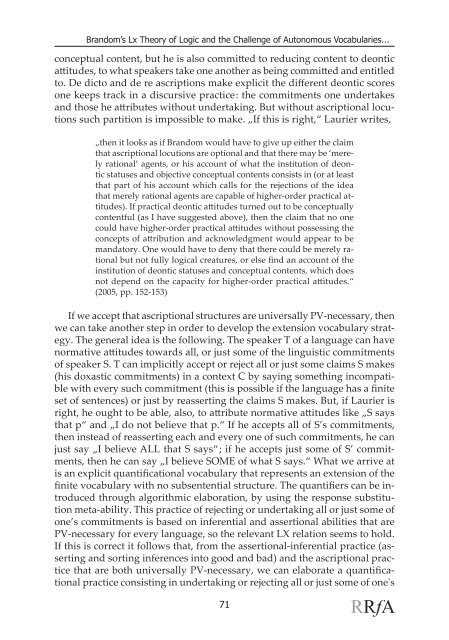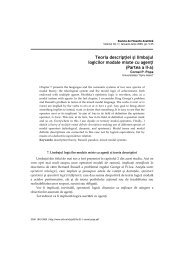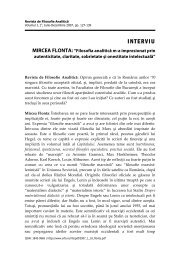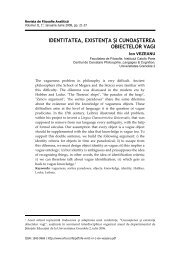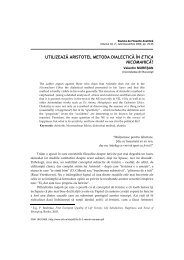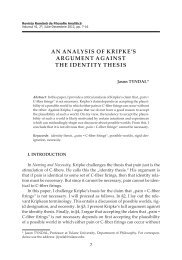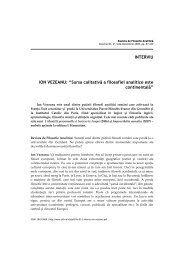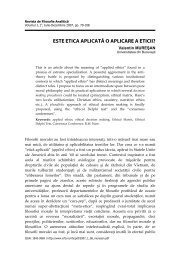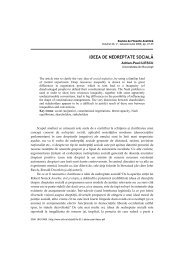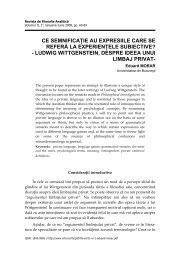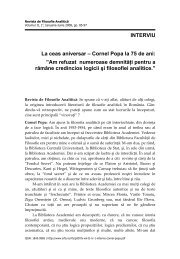brandom's lx theory of logic and the challenge of autonomous ...
brandom's lx theory of logic and the challenge of autonomous ...
brandom's lx theory of logic and the challenge of autonomous ...
You also want an ePaper? Increase the reach of your titles
YUMPU automatically turns print PDFs into web optimized ePapers that Google loves.
Br<strong>and</strong>om’s Lx Theory <strong>of</strong> Logic <strong>and</strong> <strong>the</strong> Challenge <strong>of</strong> Autonomous Vocabularies...<br />
conceptual content, but he is also committed to reducing content to deontic<br />
attitudes, to what speakers take one ano<strong>the</strong>r as being committed <strong>and</strong> entitled<br />
to. De dicto <strong>and</strong> de re ascriptions make explicit <strong>the</strong> different deontic scores<br />
one keeps track in a discursive practice : <strong>the</strong> commitments one undertakes<br />
<strong>and</strong> those he attributes without undertaking. But without ascriptional locutions<br />
such partition is impossible to make. „If this is right,“ Laurier writes,<br />
„<strong>the</strong>n it looks as if Br<strong>and</strong>om would have to give up ei<strong>the</strong>r <strong>the</strong> claim<br />
that ascriptional locutions are optional <strong>and</strong> that <strong>the</strong>re may be ‘merely<br />
rational’ agents, or his account <strong>of</strong> what <strong>the</strong> institution <strong>of</strong> deontic<br />
statuses <strong>and</strong> objective conceptual contents consists in (or at least<br />
that part <strong>of</strong> his account which calls for <strong>the</strong> rejections <strong>of</strong> <strong>the</strong> idea<br />
that merely rational agents are capable <strong>of</strong> higher-order practical attitudes).<br />
If practical deontic attitudes turned out to be conceptually<br />
contentful (as I have suggested above), <strong>the</strong>n <strong>the</strong> claim that no one<br />
could have higher-order practical attitudes without possessing <strong>the</strong><br />
concepts <strong>of</strong> attribution <strong>and</strong> acknowledgment would appear to be<br />
m<strong>and</strong>atory. One would have to deny that <strong>the</strong>re could be merely rational<br />
but not fully <strong>logic</strong>al creatures, or else find an account <strong>of</strong> <strong>the</strong><br />
institution <strong>of</strong> deontic statuses <strong>and</strong> conceptual contents, which does<br />
not depend on <strong>the</strong> capacity for higher-order practical attitudes.“<br />
(2005, pp. 152-153)<br />
If we accept that ascriptional structures are universally PV-necessary, <strong>the</strong>n<br />
we can take ano<strong>the</strong>r step in order to develop <strong>the</strong> extension vocabulary strategy.<br />
The general idea is <strong>the</strong> following. The speaker T <strong>of</strong> a language can have<br />
normative attitudes towards all, or just some <strong>of</strong> <strong>the</strong> linguistic commitments<br />
<strong>of</strong> speaker S. T can implicitly accept or reject all or just some claims S makes<br />
(his doxastic commitments) in a context C by saying something incompatible<br />
with every such commitment (this is possible if <strong>the</strong> language has a finite<br />
set <strong>of</strong> sentences) or just by reasserting <strong>the</strong> claims S makes. But, if Laurier is<br />
right, he ought to be able, also, to attribute normative attitudes like „S says<br />
that p“ <strong>and</strong> „I do not believe that p.“ If he accepts all <strong>of</strong> S’s commitments,<br />
<strong>the</strong>n instead <strong>of</strong> reasserting each <strong>and</strong> every one <strong>of</strong> such commitments, he can<br />
just say „I believe ALL that S says“ ; if he accepts just some <strong>of</strong> S’ commitments,<br />
<strong>the</strong>n he can say „I believe SOME <strong>of</strong> what S says.“ What we arrive at<br />
is an explicit quantificational vocabulary that represents an extension <strong>of</strong> <strong>the</strong><br />
finite vocabulary with no subsentential structure. The quantifiers can be introduced<br />
through algorithmic elaboration, by using <strong>the</strong> response substitution<br />
meta-ability. This practice <strong>of</strong> rejecting or undertaking all or just some <strong>of</strong><br />
one’s commitments is based on inferential <strong>and</strong> assertional abilities that are<br />
PV-necessary for every language, so <strong>the</strong> relevant LX relation seems to hold.<br />
If this is correct it follows that, from <strong>the</strong> assertional-inferential practice (asserting<br />
<strong>and</strong> sorting inferences into good <strong>and</strong> bad) <strong>and</strong> <strong>the</strong> ascriptional practice<br />
that are both universally PV-necessary, we can elaborate a quantificational<br />
practice consisting in undertaking or rejecting all or just some <strong>of</strong> one's<br />
71


